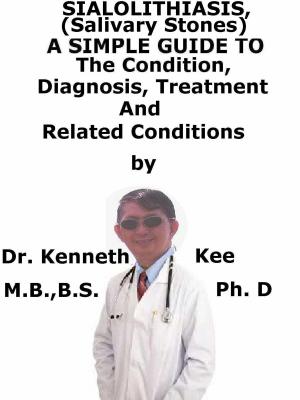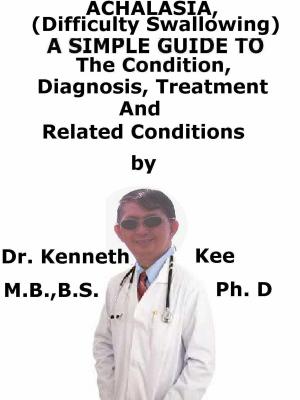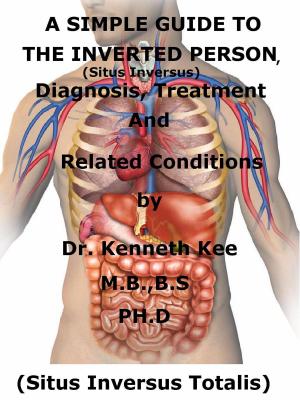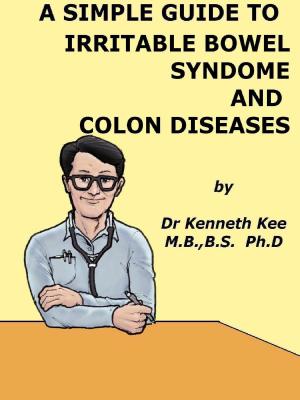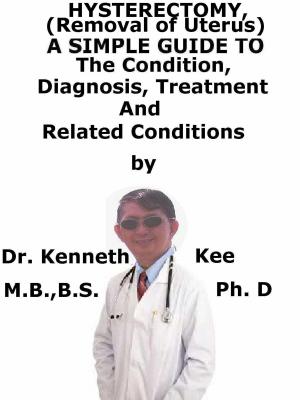Ulcerative Colitis, A Simple Guide To The Condition, Treatment And Related Conditions
Nonfiction, Health & Well Being, Medical, Specialties, Internal Medicine, Gastroenterology, Health, Ailments & Diseases, Abdominal| Author: | Kenneth Kee | ISBN: | 9781370808045 |
| Publisher: | Kenneth Kee | Publication: | November 17, 2016 |
| Imprint: | Smashwords Edition | Language: | English |
| Author: | Kenneth Kee |
| ISBN: | 9781370808045 |
| Publisher: | Kenneth Kee |
| Publication: | November 17, 2016 |
| Imprint: | Smashwords Edition |
| Language: | English |
Ulcerative Colitis is an inflammatory disease of the colon and rectum which causes ulcers in the lining of the colon and rectum.
The ulcers can then bleed and produce pus, leading to the rapid emptying of the colon and diarrhea.
It has been suggested that an autoimmune disease is the main cause of Ulcerative Colitis disease.
Psychological problems like stress and anxiety are not a cause of Ulcerative Colitis but have been known to trigger off the disease.
Mild cases (about 50%) usually have:
1. An insidious onset
2. Lower abdominal pain
3. Slight blood stained diarrhea
In the more severe cases, the main symptoms may be:
1. Abrupt onset
2. Severe diffuse abdominal pain
3. Bloody diarrhea
4. Fever
5. Shock
Colonoscopy is also done to confirm evidence of ulcerative colitis and exclude malignant tumors.
Mild Cases:
1. Antidiarheal and bulk forming agents
2. Antispasmodic medication for spasm of the colon
3. Sulfasalazine (immunosuppressant) given indefinitely
Other 5-ASA agents, such as olsalazine, mesalamine, and balsalazide, may be used by people who cannot take sulfasalazine.
4. Topical corticosteroids as retention enema or suppositories only where the rectum is involved.
5. Correction of anemia
Severe cases:
1. Hospitalization with bed rest, fluids, electrolyte replacement and blood transfusion if necessary
2. Systemic corticosteroids (intravenous initially, followed by oral medications)
These should not be given for long term usage because of side effects.
3. Oral mesalazine (immunosuppressant) given indefinitely
4. Azathioprine (Imuran), Cyclosporine (Neoral) and 6-mercapto-purine (6-MP) all other immunosuppressants can also reduce inflammation by suppressing the immune system
5. Infliximab (Remicade) is an anti-tumor necrosis factor (anti-TNF) agent is given through intravenous infusion every 6 to 8 weeks at a hospital or outpatient center.
Side effects may include toxicity and increased risk of infections, particularly tuberculosis.
6. Antibiotics in toxic megacolon syndrome
Surgery is done if the attacks are severe, do not respond to treatment, toxic megacolon or uncontrollable bleeding.
Surgery is also done for complications such as a fistula or intestinal obstruction.
In more severe cases a total proctocolectomy with ileostomy (a stoma is left in the abdomen for disposal of feces) is done and is usually curative.
Ileoanal anastomosis in which the ileum is attached to the anus allows the patient to have normal bowel movements because the anus is preserved.
Emergency surgery may be done for perforation, peritonitis, or continued bleeding.
TABLE OF CONTENT
Introduction
Chapter 1 Ulcerative Colitis
Chapter 2 More Facts of Ulcerative Colitis
Chapter 3 Treatment of Ulcerative Colitis
Chapter 4 Crohn Syndrome
Chapter 5 Diverticulosis
Chapter 6 Osteoporosis
Chapter 7 Irritable Bowel Syndrome
Epilogue
Ulcerative Colitis is an inflammatory disease of the colon and rectum which causes ulcers in the lining of the colon and rectum.
The ulcers can then bleed and produce pus, leading to the rapid emptying of the colon and diarrhea.
It has been suggested that an autoimmune disease is the main cause of Ulcerative Colitis disease.
Psychological problems like stress and anxiety are not a cause of Ulcerative Colitis but have been known to trigger off the disease.
Mild cases (about 50%) usually have:
1. An insidious onset
2. Lower abdominal pain
3. Slight blood stained diarrhea
In the more severe cases, the main symptoms may be:
1. Abrupt onset
2. Severe diffuse abdominal pain
3. Bloody diarrhea
4. Fever
5. Shock
Colonoscopy is also done to confirm evidence of ulcerative colitis and exclude malignant tumors.
Mild Cases:
1. Antidiarheal and bulk forming agents
2. Antispasmodic medication for spasm of the colon
3. Sulfasalazine (immunosuppressant) given indefinitely
Other 5-ASA agents, such as olsalazine, mesalamine, and balsalazide, may be used by people who cannot take sulfasalazine.
4. Topical corticosteroids as retention enema or suppositories only where the rectum is involved.
5. Correction of anemia
Severe cases:
1. Hospitalization with bed rest, fluids, electrolyte replacement and blood transfusion if necessary
2. Systemic corticosteroids (intravenous initially, followed by oral medications)
These should not be given for long term usage because of side effects.
3. Oral mesalazine (immunosuppressant) given indefinitely
4. Azathioprine (Imuran), Cyclosporine (Neoral) and 6-mercapto-purine (6-MP) all other immunosuppressants can also reduce inflammation by suppressing the immune system
5. Infliximab (Remicade) is an anti-tumor necrosis factor (anti-TNF) agent is given through intravenous infusion every 6 to 8 weeks at a hospital or outpatient center.
Side effects may include toxicity and increased risk of infections, particularly tuberculosis.
6. Antibiotics in toxic megacolon syndrome
Surgery is done if the attacks are severe, do not respond to treatment, toxic megacolon or uncontrollable bleeding.
Surgery is also done for complications such as a fistula or intestinal obstruction.
In more severe cases a total proctocolectomy with ileostomy (a stoma is left in the abdomen for disposal of feces) is done and is usually curative.
Ileoanal anastomosis in which the ileum is attached to the anus allows the patient to have normal bowel movements because the anus is preserved.
Emergency surgery may be done for perforation, peritonitis, or continued bleeding.
TABLE OF CONTENT
Introduction
Chapter 1 Ulcerative Colitis
Chapter 2 More Facts of Ulcerative Colitis
Chapter 3 Treatment of Ulcerative Colitis
Chapter 4 Crohn Syndrome
Chapter 5 Diverticulosis
Chapter 6 Osteoporosis
Chapter 7 Irritable Bowel Syndrome
Epilogue




